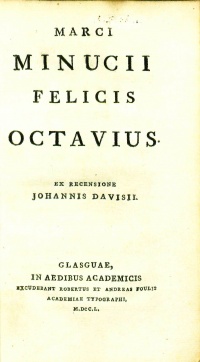Difference between revisions of "Marci Minucii Felicis Octavius"
From Wythepedia: The George Wythe Encyclopedia
m |
(Quote) |
||
| Line 3: | Line 3: | ||
__NOTOC__ | __NOTOC__ | ||
[[File:MinuciusMarciMinuciiFelicisOctavius1750TitlePage.jpg|right|thumb|200px|Title Page from [https://catalog.swem.wm.edu/law/Record/3757399 ''Marci Minucii Felicis Octavius''], George Wythe Collection, Wolf Law Library, College of William & Mary]] | [[File:MinuciusMarciMinuciiFelicisOctavius1750TitlePage.jpg|right|thumb|200px|Title Page from [https://catalog.swem.wm.edu/law/Record/3757399 ''Marci Minucii Felicis Octavius''], George Wythe Collection, Wolf Law Library, College of William & Mary]] | ||
| + | <blockquote>[http://en.wikipedia.org/wiki/Minucius_Felix Minucius Felix] was a Roman advocate, rhetorician, and Christian apologist. Like Lactantius, Minucius was a convert to Christianity. His only known work, the dialogue Octavius, is one of the earliest examples of Latin apologetics; it is an attack upon paganism and skepticism, and a defense of early Christianity as it was known in the Roman world. Minucius is of interest not only to theologians and Church historians, but also to those with an interest in philosophy and rhetoric. Unlike other Latin apologists of the period, such as Tertullian, who asserted credo quia ineptum (I believe because [it is] absurd) (De Carne Christi 5.4), and who was openly hostile to speculative philosophy, Minucius attempted to establish at least the rational possibility of the Christian faith. The rhetoric found within the Octavius can be considered Ciceronian, having elements of the six-part speech (exordium, narration, partition, confirmation, refutation, and conclusion). This text represents an important stage in the evolution of rhetoric from a primarily oral, forensic, and political art, to a literary art.<ref>''Internet Encyclopedia of Philosophy'', s.v. "Minucius Felix (c. 2nd and 3rd C. CE)," accessed Oct. 8, 2013, http://www.iep.utm.edu/minucius/.</ref></blockquote> | ||
==Bibliographic Information== | ==Bibliographic Information== | ||
| − | '''Author:''' Marcus Minucius Felix | + | '''Author:''' Marcus Minucius Felix. |
'''Title:''' ''Marci Minucii Felicis Octavius''. | '''Title:''' ''Marci Minucii Felicis Octavius''. | ||
| Line 11: | Line 12: | ||
'''Publication Info:''' Glasguae: In aedibus academicis excudebant Robertus et Andreas Foulis ..., 1750. | '''Publication Info:''' Glasguae: In aedibus academicis excudebant Robertus et Andreas Foulis ..., 1750. | ||
| − | '''Edition:''' | + | '''Edition:''' ; [4], 112, [12] pages. |
==Evidence for Inclusion in Wythe's Library== | ==Evidence for Inclusion in Wythe's Library== | ||
==Description of the Wolf Law Library's copy== | ==Description of the Wolf Law Library's copy== | ||
| − | Bound in contemporary calf, rebacked. Board edges stamped and gilt. | + | Bound in contemporary calf, rebacked. Board edges stamped and gilt.<br /> |
| + | <br /> | ||
| + | View this book in [https://catalog.swem.wm.edu/law/Record/3757399 William & Mary's online catalog]. | ||
| − | |||
==External Links== | ==External Links== | ||
[http://books.google.com/books?id=XtIPAAAAQAAJ&printsec=frontcover&dq=Marci+Minucii+Felicis+Octavius&hl=en&sa=X&ei=3YvlUYzgF5Wv4AOyz4BI&ved=0CDgQ6AEwAQ Google Books] | [http://books.google.com/books?id=XtIPAAAAQAAJ&printsec=frontcover&dq=Marci+Minucii+Felicis+Octavius&hl=en&sa=X&ei=3YvlUYzgF5Wv4AOyz4BI&ved=0CDgQ6AEwAQ Google Books] | ||
Revision as of 12:26, 8 October 2013
by Marcus Minucius Felix

Title Page from Marci Minucii Felicis Octavius, George Wythe Collection, Wolf Law Library, College of William & Mary
Minucius Felix was a Roman advocate, rhetorician, and Christian apologist. Like Lactantius, Minucius was a convert to Christianity. His only known work, the dialogue Octavius, is one of the earliest examples of Latin apologetics; it is an attack upon paganism and skepticism, and a defense of early Christianity as it was known in the Roman world. Minucius is of interest not only to theologians and Church historians, but also to those with an interest in philosophy and rhetoric. Unlike other Latin apologists of the period, such as Tertullian, who asserted credo quia ineptum (I believe because [it is] absurd) (De Carne Christi 5.4), and who was openly hostile to speculative philosophy, Minucius attempted to establish at least the rational possibility of the Christian faith. The rhetoric found within the Octavius can be considered Ciceronian, having elements of the six-part speech (exordium, narration, partition, confirmation, refutation, and conclusion). This text represents an important stage in the evolution of rhetoric from a primarily oral, forensic, and political art, to a literary art.[1]
Bibliographic Information
Author: Marcus Minucius Felix.
Title: Marci Minucii Felicis Octavius.
Publication Info: Glasguae: In aedibus academicis excudebant Robertus et Andreas Foulis ..., 1750.
Edition: ; [4], 112, [12] pages.
Evidence for Inclusion in Wythe's Library
Description of the Wolf Law Library's copy
Bound in contemporary calf, rebacked. Board edges stamped and gilt.
View this book in William & Mary's online catalog.
External Links
References
- ↑ Internet Encyclopedia of Philosophy, s.v. "Minucius Felix (c. 2nd and 3rd C. CE)," accessed Oct. 8, 2013, http://www.iep.utm.edu/minucius/.